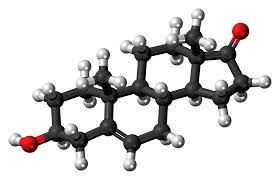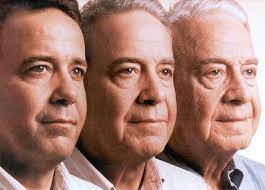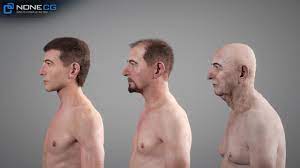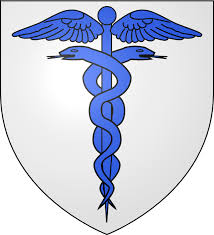Andropause A Mid-life Hormone Crisis
Andropause FAQ
What is Andropause?
Andropause is a medical state that is a natural result of aging, in which symptoms manifest from a decline in Testosterone Production and other male hormones such as dehydroepiandrosterone, also referred to as DHEA.
Andropause is a universal factor of the male condition. However, each male will physiologically react to the condition in their own way, and some men will display symptoms much earlier than others.
How Fast do Testosterone Levels Decline Over Time?
From the age of puberty to around the late twenties, males are flush with Testosterone, which contributes to optimal health and wellness. Around the late  twenties or early thirties, however, these levels start to drop, at a rate of around 1%-2% per year. This decline is slow and without symptoms at first, but as the decline becomes more severe, the changes start to become apparent.
twenties or early thirties, however, these levels start to drop, at a rate of around 1%-2% per year. This decline is slow and without symptoms at first, but as the decline becomes more severe, the changes start to become apparent.
How Can I Qualify for Andropause Treatment?
To be prescribed Testosterone Treatment for Andropause or other effective treatments, you must undergo clinical evaluation. Many men have Low Testosterone without displaying symptoms. To qualify for Low-T treatment, you must not only have clinically low levels of Testosterone but also display symptoms of the condition.
Many conditions, including prostate cancer and severe sleep apnea, may prevent you from qualifying for treatment.
What Blood Tests Are Necessary To Diagnose Andropause?
Although your doctor may order various tests to assess your overall health and hormone balance fully, the Free Testosterone Test is the most crucial test for Age-Related Low-T. Free Testosterone is also referred to as Bioavailable Testosterone and refers to the amount of Testosterone available for use by the body and not currently being used.
With a saliva or blood sample, it is possible to take a snapshot of your current Free Testosterone Levels.
What is Total Testosterone?
Total Testosterone refers to all Testosterone that is circulating through your bloodstream. This includes both Free (Bioavailable) Testosterone and bound Testosterone.
Why Is the Total Testosterone Test Insufficient for the Diagnosis of Andropause?
The vast majority of patients with Symptomatic Andropause have clinically normal Total Testosterone Levels, meaning that if Total Testosterone alone is evaluated, most patients with Andropause will appear to have normal Testosterone Levels because of the wrong factor is being measured.
Recent research has shown that among men with Andropause, only 13% show depressed Total Testosterone Levels, whereas nearly three out of four of those patients had Low Free Testosterone Levels.
Because many physicians only measure Total Testosterone when evaluating Andropause, symptoms of Testosterone Deficiency are often diagnosed mistakenly as resultant of chronic fatigue, stress, depression, and other factors.
Many treatments for these conditions actually have a depressant effect on Testosterone, which could exacerbate symptoms in the long run.
By Fifty, What Percentage of Men Have Abnormally Low Free Testosterone Levels?
Among men over fifty, it is approximated that roughly half of the men have Free Testosterone Concentrations that would be considered clinically low for men between the ages of thirty and forty.
What Are Other Names for Andropause?
Several different names often refer to andropause. For the sake of simplicity, it is often referred to in the media as Low-T. However, Low-T is a broader term that simply refers to any physiological state in which Testosterone Levels are inadequate to meet the body's needs.
Another informal term for Andropause is Manopause, which is used further to emphasize the physiological connection between Menopause and Andropause.
 Andropause is also sometimes referred to as Age-Related Testosterone Deficiency, which is a more adequate representation of the condition because Andropause is an age-dependent chronic condition. Other similar names include Partial Androgen Deficiency in Aging Males, Androgen Deficiency of the Aging Male, and Symptomatic Late-Onset Hypogonadism.
Andropause is also sometimes referred to as Age-Related Testosterone Deficiency, which is a more adequate representation of the condition because Andropause is an age-dependent chronic condition. Other similar names include Partial Androgen Deficiency in Aging Males, Androgen Deficiency of the Aging Male, and Symptomatic Late-Onset Hypogonadism.
Because Andropause has not been entirely accepted as a medical condition by the World Health Organization or the Food and Drug Administration, there is not a codified set of terms related to the condition.
However, there is a large amount of ongoing study, and medical professionals widely recognize the condition and medical research institutes both nations- and worldwide.
What Causes Andropause?
Andropause is caused by a combination of hereditary factors and lifestyle choices, also known as Internal and External Causes. Internal causes are genetic.
Before Andropause occurs, the body enters a state of hypogonadotrophic hypogonadism. During this period, the body produces less Testosterone than is produced by younger, healthier men.
Hypogonadotropic hypogonadism is a state in which the brain does not respond adequately to signals that Testosterone Levels are insufficient to promote the optimal health of the human body. Hypogonadotropic hypogonadism generally takes place around the age of forty.
Testosterone production will continue to decline over time, eventually to a point at which the pituitary and the hypothalamus respond by producing elevated concentrations of Gonadotropin-Releasing Hormone and Luteinizing Hormone to rebound declining Testosterone. This is effective for a brief period, but the body eventually reverts to a state of decline.
This is the period in which Andropause takes place. Hypogonadotropic hypogonadism refers to the early state at which GnRH and LH Levels are low in combination with Testosterone. Andropause refers to the period at which Testosterone Production remains inhibited despite increased LH and GnRH levels.
This hormonal change is absolutely average because it is a natural progression of male hormone balance, which bears some similarities to menopause, hence the name.
One significant way that Andropause and Menopause differ is that there is more variation when men begin to experience change. Women will reach menopause between the early 40s and 50s, whereas some men will begin to experience symptoms before or even after that period.
What Are Lifestyle Factors Which Encourage Symptoms of Andropause?
Although the human body has a baseline of Testosterone Production dependent on age and genetics, this production can be affected by lifestyle choices that further suppress Testosterone Levels in the body.
The following are some factors that can inhibit the body's natural ability to release Testosterone:
Inadequate Sleep
Poor Diet
Sedentary Lifestyle
Medications
Overindulgence of Alcohol
Stress
Illness
What Are the Symptoms of Andropause?
Andropause is a complex condition that affects male health in various ways. The following are some symptoms associated with Age-Related Testosterone Deficiency:
Insomnia
Head and Back Aches
Reduced Sex Drive
Depression
Mood Instability
Hot Flashes
Hypersensitivity
Irritability
Social Withdrawal
Anger
Unhealthy Changes in Body Composition
Fatigue
Loss of Bone Mineral Density
What Are Some Effective Andropause Treatments Available?
Men with Andropause can benefit significantly from Hormone Replacement Therapy. There are some options available to Andropause patients, including:
Testosterone Patches
Testosterone Creams
Testosterone Gels
Injectable Testosterone (Testosterone Enanthate, Testosterone Cypionate, etc.)
Testosterone Pellet Therapy
Clomiphene Citrate
What is the Difference Between Andropause and Primary Testosterone Deficiency?
Most men suffering from symptoms related to Andropause have perfectly functioning testes but do not receive sufficient signaling from the hypothalamus to produce enough Testosterone to meet the body's needs.
Andropause is a form of secondary hypogonadism related to age. The older men get, the less efficient their bodies produce testosterone. Primary Testosterone Deficiency is Low-T which is the result of a direct malfunction of the testes, which prevents the body from being able to produce Testosterone at normal levels.
Both of these forms of Testosterone Deficiency can be treated with Bioidentical Testosterone Therapy. Still, more off-label options are available to  patients suffering from Andropause and other forms of Secondary Hypogonadism, such as Clomiphene Citrate.
patients suffering from Andropause and other forms of Secondary Hypogonadism, such as Clomiphene Citrate.
Testosterone production results from a cascade of signals that begins at the hypothalamus. The hypothalamus releases a hormone known as gonadotropin-releasing hormone (GnRH), which circulates to the pituitary, stimulating the production of Follicle-Stimulating Hormone and Luteinizing Hormone, which both contribute heavily to the healthy function of the male reproductive system.
Luteinizing Hormone stimulates the production of Testosterone and other male sex hormones, while Follicle-Stimulating Hormone promotes the healthy production of sperm.
What Are Some Health Risks Associated with Andropause?
Andropause is correlated with many health conditions that can severely impact health and wellness, including:
Diabetes
Hypertension
Obesity
Chronic Fatigue
Heart Attack
Stroke
Evidence shows Andropause increases the risk of Alzheimer's and other neurological disorders.
What is the Goal of Andropause Treatment?
The ultimate goal of Andropause Treatment is not to flood the body with Testosterone but simply to restore Testosterone Levels in the body to normal, physiological levels. In general, Testosterone Replacement Therapy Treatments aim to restore Testosterone Concentrations to what would be considered mid-normal for a man in his twenties.
In restoring Testosterone Levels to these physiologically normal levels, it is possible to significantly mitigate the symptoms of Andropause, helping men live healthier lives.
What Are the Benefits of Andropause Treatment?
Higher Quality of Life
Fewer Mood Swings
Reduced Irritability and Anxiety
Preserved Bone Mineral Density
More Energy
Enhanced Muscle Health
Increased Metabolism
Improved Capacity to Burn Fat
Increased Libido
There is preliminary evidence that shows that Testosterone Treatment also improves cardiovascular health, but more research is needed.
Does Andropause Treatment Cause Cancer?
There is no evidence that Testosterone Therapy for Andropause causes cancer. Still, the treatment can exacerbate existing forms of cancer, including breast and prostate cancer, and should not be prescribed to individuals that have or are at high risk of these or other forms of cancer.
How Can I Treat Infertility Related to Andropause?
Unfortunately, Testosterone alone is not capable of restoring fertility. This is because Bioidentical Testosterone suppresses the testes' ability to produce Testosterone and sperm for the duration of therapy.
This is temporary, and testosterone production will return after therapy has been suspended, but for patients interested in having children, Testosterone Treatment alone will not be sufficient.
Testosterone can, however, be combined with Human Chorionic Gonadotropin (HCG) to simultaneously increase Testosterone Concentrations in the body while simultaneously preserving fertility and the normal function of the Testes.
In the male body, HCG acts as a functional analog of Luteinizing Hormone, preserving the body's ability to make some of its own Testosterone while preserving the patient's fertility.
Clomiphene citrate (brand name: Clomid) is sometimes prescribed to men with Testosterone Deficiency/Andropause that are interested in Testosterone Restoration, which also preserves fertility.
Clomiphene increases Testosterone and Sperm Production by inhibiting harmful feedback mechanisms, which can limit the healthy production of Testosterone.
Is It Possible to Use Erectile Dysfunction Medications During Andropause Treatment?
Yes, but you may not have to in the long run. Andropause is one of the leading causes of Erectile Dysfunction as men grow older, and many men with Age-Related Testosterone Deficiency report that as a result of Testosterone Replacement Therapy, they no longer rely as heavily on Erectile Dysfunction Medications.
Many patients even report that they no longer need to use such medications.
Research shows that taking Erectile Dysfunction medications with Testosterone Therapy can resolve ED issues in 95% of patients.
What Are the Potential Side-Effects of Testosterone Therapy for Andropause?
As with any form of medical treatment, there are risks associated with Testosterone Restoration. The following are some of the risks associated with Andropause Treatment:
Oily Skin, increased prevalence of acne
Male-Pattern Baldness
Headaches
Prolonged/Frequent Erections
Gynecomastia (increased breast tissue can be treated with estrogen-blockers such as Arimadex)
Increased Red Blood Cell Count (can be treated via blood donation)
Accidental long-term overdose can lead to Heart Disease
All patients that take Testosterone will experience the following symptoms resulting from therapy:
Reduced Fertility
Testicular Shrinkage
These temporary symptoms will slowly return to a normal state after treatment ends. Combining Testosterone with HCG can prevent these symptoms, as can Low-T Treatment with clomiphene citrate.
How Can I Mitigate the Effects of Andropause Through Lifestyle?
What Should I Avoid the Onset of Andropause Symptoms?
Stop Smoking and Using Tobacco Andropause hurts cardiovascular health, and smoking only exacerbates the risk of cardiovascular complications. Also, smoking reduces normal erectile function because nicotine encourages vasoconstriction, which reduces the ability of the body to rush blood flow to the potential erection.
Don't Abuse Alcohol. Alcohol promotes the body's estrogen production, which depresses testosterone production. Also, alcohol reduces zinc levels in the body, which reduces the ability of the body to control estrogen production adequately.
What Should I Do to Delay the Onset and Severity of Andropause Symptoms?
Lose Weight Adipose body fat has the natural ability to promote elevated estrogen levels, which suppress testosterone production in men. By losing weight, it is possible to promote a healthier testosterone balance.
Eat Healthier Your body also needs a well-rounded diet rich in nutrients to promote optimal hormone balance and mitigate the effects of Andropause. Although the body needs some fat, diets that are high in fat will expose the body to more estrogen.
Also, organic foods can help improve Testosterone levels because many common pesticides have estrogenic qualities. Finally, a diet rich in cruciferous vegetables such as cauliflower and broccoli promotes healthy testosterone balance due to naturally occurring antioxidant compounds such as indole-3-carbinol.
Make a Concerted Effort to Improve Sleeping Habits The body produces Testosterone primarily at night. By taking the steps to make sure that you get all the sleep your body needs, you protect your body's natural ability to produce Testosterone.
Take Zinc Supplements Zinc is an essential nutrient that promotes the body's ability to produce its own Testosterone while inhibiting the body's ability to produce estrogen and other aromatase compounds that suppress Testosterone production.
Manage Stress More Effectively To promote healthy Testosterone Production, it is essential to control one's stress. Stress increases the production of cortisol, which is another cholesterol-based hormone. The body has a limited amount of these resources, and if you have too much stress, your body will divert resources from Testosterone production to Cortisol production.
What is the Average Dosage for Testosterone Restoration for Andropause?
When men are in their twenties, they generally produce between four and seven milligrams of Testosterone. Because not all Testosterone is absorbed during topical Testosterone Therapy, the initial dosage is generally between ten and twenty milligrams each day to bring Free Testosterone Production  back to normal.
back to normal.
Because of potential issues related to elevated Testosterone Levels, it is prudent to start with a small dose to provide benefits with the lowest risk of side effects. Generally, patients will stay on this starter dose for around three or four months, then return for further evaluation.
Their dose will remain the same or be adjusted based on further testing and an evaluation of the effectiveness of treatment.
References:
Andropause: The Male Menopause
Frequently Asked Questions about Andropause (Male Menopause) and Testosterone Replacement Therapy
http://www.apothecaryoptions.com/pdf/atrfaq.pdf
Wikipedia: Andropause
http://en.wikipedia.org/wiki/Andropause
- What Is Adrenal Fatigue [Last Updated On: August 20th, 2024] [Originally Added On: October 23rd, 2020]
- Understanding Thyroid Function And Diagnosing Thyroid Issues [Last Updated On: August 21st, 2024] [Originally Added On: October 24th, 2020]
- Twelve Steps To Enhance And Preserve Your Memory [Last Updated On: January 28th, 2025] [Originally Added On: October 25th, 2020]
- The Psychological And Physiological Effects Of Serotonin [Last Updated On: January 28th, 2025] [Originally Added On: October 26th, 2020]
- The Facts About Psoriasis: Symptoms And Causes [Last Updated On: January 27th, 2025] [Originally Added On: October 27th, 2020]
- The Facts About Acromegaly [Last Updated On: August 24th, 2024] [Originally Added On: October 28th, 2020]
- The Effects Of Hgh Deficiency Upon One Of A Pair Of Twins [Last Updated On: January 27th, 2025] [Originally Added On: October 29th, 2020]
- Resveratrol Anti-aging Supplementation For Longevity [Last Updated On: August 19th, 2024] [Originally Added On: October 30th, 2020]
- Sermorelin Acetate Injections With Ghrp-6 [Last Updated On: February 18th, 2025] [Originally Added On: October 31st, 2020]
- Melatonin The Sleep Hormone How It Impacts Your Health [Last Updated On: August 26th, 2024] [Originally Added On: November 1st, 2020]
- Mark Cuban To Fund Study On Healing Power Of Hgh [Last Updated On: August 27th, 2024] [Originally Added On: November 2nd, 2020]
- Mark Cuban Advocates For Hgh As A Rehab And Recovery Tool [Last Updated On: January 26th, 2025] [Originally Added On: November 3rd, 2020]
- Leptin Hormone Guide: The Effects Of The Satiety Hormone [Last Updated On: January 26th, 2025] [Originally Added On: November 4th, 2020]
- Human Growth Hormone Deficiency Impact On Sleeping Habits [Last Updated On: January 25th, 2025] [Originally Added On: November 5th, 2020]
- Human Growth Hormone And Liver Regeneration [Last Updated On: January 25th, 2025] [Originally Added On: November 6th, 2020]
- Hgh Treatment For Fatty Liver Disease On The Horizon [Last Updated On: February 17th, 2025] [Originally Added On: November 7th, 2020]
- Your Current HGH Level [Last Updated On: March 28th, 2025] [Originally Added On: November 8th, 2020]
- Ghrelin The Hunger Hormone [Last Updated On: January 24th, 2025] [Originally Added On: November 9th, 2020]
- Enclomiphene Citrate Andropause Treatment Up For Fda Approval [Last Updated On: January 24th, 2025] [Originally Added On: November 10th, 2020]
- Dopamine Pleasure Hormone And So Much More [Last Updated On: July 27th, 2024] [Originally Added On: November 11th, 2020]
- Diabetes Cure On The Horizon [Last Updated On: January 23rd, 2025] [Originally Added On: November 12th, 2020]
- Boost Metabolism To Lose Weight And Maintain Weight Loss [Last Updated On: January 23rd, 2025] [Originally Added On: November 13th, 2020]
- SOGROYA INJECTIONS FOR HUMAN GROWTH HORMONE DEFICIENCY [Last Updated On: February 19th, 2025] [Originally Added On: March 24th, 2021]
- How Do High and Low Estrogen Impact Male Health and Wellness? [Last Updated On: February 9th, 2025] [Originally Added On: April 2nd, 2021]
- The Effects Of Hormone Imbalance On Belly Fat [Last Updated On: February 18th, 2025] [Originally Added On: May 8th, 2021]
- Could Sunlight Help Remove Rogue Hormones from the Water Supply? [Last Updated On: February 20th, 2025] [Originally Added On: May 29th, 2021]
- Weekly HGH Therapy Just as Effective as Daily Injections [Last Updated On: April 4th, 2025] [Originally Added On: June 18th, 2021]
- DHEA and Testosterone: A winning team! [Last Updated On: February 14th, 2025] [Originally Added On: January 19th, 2022]
- Animal Research Discovers Link Between Exercise, HGH, and Cognitive Ability [Last Updated On: February 14th, 2025] [Originally Added On: May 20th, 2022]
- Weekly Hormone Treatments for Adult HGH Deficiency with Sogroya [Last Updated On: February 18th, 2025] [Originally Added On: June 14th, 2022]
- Ancient Critters Made Human Hormone System What It Is Today [Last Updated On: March 13th, 2025] [Originally Added On: June 26th, 2022]
- How Substance Abuse Can Affect Your Hormone Levels [Last Updated On: March 16th, 2025] [Originally Added On: August 4th, 2022]
- A Holistic Approach to Health and Water Safety [Last Updated On: February 7th, 2025] [Originally Added On: February 7th, 2025]
- Understanding the Role of Sogroya in Adult Human Growth Hormone (HGH) Deficiency Treatment [Last Updated On: February 12th, 2025] [Originally Added On: February 11th, 2025]
- Andropause: An Examination of Mid-life Hormonal Shifts in Males [Last Updated On: February 16th, 2025] [Originally Added On: February 13th, 2025]
- Sermorelin Acetate Therapy: A Comprehensive Insight into its Benefits with GHRP-6 [Last Updated On: February 17th, 2025] [Originally Added On: February 14th, 2025]
- The Dynamic Duo of Male Vitality: Testosterone and DHEA [Last Updated On: February 14th, 2025] [Originally Added On: February 14th, 2025]
Word Count: 2416






